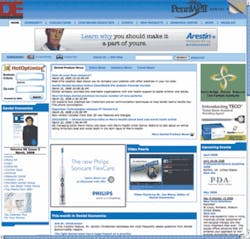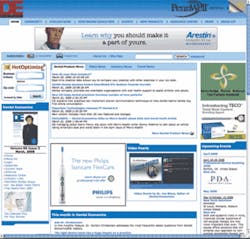Searching the Internet andwww.dentaleconomics.com
For more on this topic, go to www.dentaleconomics.com and search using the following key words: Internet, search engines, www.dentaleconomics.com, key words, dental magazines.
by Jeffrey B. Dalin, DDS, FACD, FAGD, FICD
There is much great and useful information in cyberspace. There are billions of pages on the Web. Every minute of every day, people add more. This is why search engines and directories are indispensable.
They use software programs known as robots or spiders that automatically follow hyperlinks from one document to the next around the Web. When these programs discover a new site, they send information back to its main site to be indexed. Web documents are retrieved by these programs and analyzed. Data collected from each Web page are then added to the search engine index. When you enter a query at a search engine site, your input is checked against the search engine"s index of all Web pages it has analyzed.
The best URL's are then returned to you as "hits," ranked in order with the best results at the top. Google is the largest search site, currently claiming to index more than 3.3 billion pages while All-the-Web is just behind at more than 3.1 billion. I could write a book on how search engines work, how to use them, and site optimization. But let"s see what I can summarize in just a couple of pages.
Key word searching is the most common form of text search on the Web. Most search engines do their text query and retrieval using key words. A key word is simply any word on a Web page. Key words are designed to tell a user something about the subject and content of this page.
The author of the Web page specifies key words by using meta tags. This means that search engines will pull out and index words that appear to be significant. Search engines work according to rules established by their creators for what words are usually important in a broad range of documents.
The title of a page, for example, usually gives useful information about the subject of the page. Words that are mentioned toward the beginning of a document are given more weight by most search engines. The same goes for words that are repeated several times throughout the document. Some search engines index every word on every page.
Others index only part of the document. Search engines also cannot return hits on keywords that mean the same, but are not actually entered. A search for heart disease would not return a document that used the word "cardiac" instead of "heart."
Most sites offer two different types of searches: basic and advanced. In a basic search, you just enter a keyword. Advanced search options differ from one search engine to another, but some of the possibilities include the ability to search by more than one word, to give more weight to one search term than another, and to exclude words that might add too many search results.
Let's look specifically at how to search efficiently. Using the word "and" means that all the terms you specify must appear in the documents (i.e., "dental" AND "decay" ). Using the word "or" means that at least one of the terms you specify must appear in the documents (i.e., periodontal disease, acute, OR chronic).
The word "not" means that at least one of the terms you specify must not appear in the documents. You might use this if you anticipated results that would have nothing to do with what you are really searching (i.e., teeth AND crowns NOT gold). Some search engines use the characters "+" and "-" instead of words. The ability to query on phrases is important in a search engine. Those that allow it usually require that you enclose the phrase in quotation marks.
Capitalization is essential for searching on proper names of people, companies, or products. Each search engine has different methods of refining queries. The best way to learn the subtleties of each search engine site is to read the site"s "Help" files.
Most search engines return results with confidence or relevancy rankings. In other words, they list the hits according to how closely they think the results match the query. Most use search term frequency as a primary way of determining whether a document is relevant.
If your key word is a common one, or if it has multiple meanings, you could end up with a lot of irrelevant hits. Some search engines consider the frequency and the positioning of keywords to determine relevancy. The reason for this is that if the keywords appear early in the document, or in the headers, this increases the likelihood that the document is on target.
Another method is to determine which documents are most frequently linked to other documents on the Web. The reasoning here is that if other people consider certain pages important, you should, too. Some search engines are now indexing Web documents by the metatags in the documents" HTML (at the beginning of the document in the so-called "head" tag). Web page authors have some influence regarding which keywords are used to index the document, and even in the description of the document that appears when it comes up as a search engine hit.
Obviously, this is very important if you are trying to draw people to your Web site based on how your site ranks in search engines hit lists.
Here is a list of some popular search engines. Try each until you find your favorite:
- www.google.com
- www.yahoo.com
- www.msn.com
- www.alltheweb.com
- www.ask.com
- www.ditto.com
- www.draze.com
- www.clusty.com
- www.chacha.com
To search for people, try:
- www.anywho.com
- www.searchbug.com
- www.wink.com
Now that you're an expert at searching for Web information, let's search one of my favorite sites, www.dentaleconomics.com. This is a great Web site to navigate with much valuable information available at your fingertips.
On the Home page, you'll see a News tabs section where you can read about Dental Products News, Video News, Industry News, and Travel News.
You will also find tabs for Video Pearls (why not watch a video online on a useful subject), Upcoming Events (looking for some CE out of town?), This Month in Dental Economics® (you will find links here to many of the articles appearing in the current issue of DE®), Resource Center (quick links to many useful items), Quick Vote Survey (register your opinion on a brief question and see how your vote compares to others), From the Editors (where you can discuss the latest in dental news with editors via blogs) Dental Continuing Education (find Webcasts and other continuing education options here), and Financials (check up on your portfolio and other useful economic information).
Across the top of the home page you will find tabs for the following pages: Community, Publications, Continuing Education, Events, New Products, Resource Center, News, and Media Kit. You can proceed directly to these pages to work specifically with these sub-categories.
Remember that the PennWell® Dental Group has numerous publications to its credit: Dental Economics®, RDH®, Woman Dentist Journal®, Dental Office™, Grand Rounds in Oral-Systemic Medicine™, Proofs, and Dental Assisting Digest.
All of these publications can be accessed from this one site by merely clicking on the Publications tab at the top of the home page.
One of the most useful parts of the Dental Economics® site is the search field. Here you can find specific items by typing in what you are seeking. Maybe you want to re-read an interview I did with Marvin Fier on cements from the January 2008 issue.
Merely type in "dalin fier" and a link to this interview will show up. You can then click on the link to take you to the article where you can review our discussion on resin based cements.
Let's say you want to look at Editor Joe Blaes" Best Pearls of 2007 column. Merely type in "blaes best pearls 2007" and you will find a link that will take you directly to this column.
How about if you want to search for new products from any of the dental manufacturers? By typing in "3M ESPE new products," you will find numerous links to dental news announcements that deal with new dental products.
Enjoy exploring and using these search engine sites on the Web, as well as www.dentaleconomics.com. I think you will find not a day goes by when you are not using them!
Jeffrey B. Dalin, DDS, FACD, FAGD, FICD, practices general dentistry in St. Louis. He is the editor of St. Louis Dentistry magazine, and spokesman and critical-issue-response-team chairman for the Greater St. Louis Dental Society. He is a co-founder of the Give Kids A Smile program. Contact him by e-mail at [email protected], by phone at (314) 567-5612, or by fax at (314) 567-9047.

